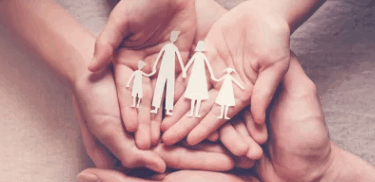How to help when your child encounters a character-defining moment
 The philosopher Friedrich Nietzsche once said, “What doesn’t destroy me, makes me stronger.” Clearly, Nietzsche never had children, because if he had, he would have said something more parent-like – i.e., more confused – about those character defining moments that children often face.
The philosopher Friedrich Nietzsche once said, “What doesn’t destroy me, makes me stronger.” Clearly, Nietzsche never had children, because if he had, he would have said something more parent-like – i.e., more confused – about those character defining moments that children often face.
A character-defining moment is not when your 8-year-old really, really wants a charm bracelet that her best friend has, or when your 12-year-old is chosen to be the starting forward on the basketball team.
No, a character-defining moment is more likely to arise when your daughter happens upon a “lost” charm bracelet on the floor in the hallway at school, or when your 12-year-old not only doesn’t get chosen to be the starting forward on the basketball team, he sits on the bench for the whole game. These moments, sometimes socially or personally risky, ethically or morally problematic, are the ones that test and ultimately shape a child’s character.
Sorry, Mr. Nietzsche, but that phrase is no help for a parent struggling with what to do when her child gets caught up in calling the new kid at school a “Geek!” Or when her child is that new kid.
So, just how do you address situations in which your child is tempted into unwanted behaviors or when he finds himself in a vulnerable and potentially isolated situation? How do you help him make decisions and choices that help him grow as a person? How do you help protect his self-esteem?
Gather Information
According to Kathleen Hoover-Dempsey, chair of the Department of Psychology and Human Development at Vanderbilt University, one of the first things to do when a situation arises is to ask questions. “You need to invite a conversation and get the child’s perspective about what’s going on,” she says. “Why he thinks it’s happening, how he feels about it, and what is motivating him, WITHOUT jumping to any conclusions.”
She suggests asking questions designed to get the child talking and thinking about the situation such as, “How did you feel about that?” “When somebody first asked you to do that, did you hesitate?” “What do you think made you hesitate?” “What did you wish would happen that would have made you feel better?”
This kind of information gathering can be extended to others who are involved as well. You might need to check with a neighbor, a teacher, the parent of a best friend, a prior coach, etc. Hoover-Dempsey reminds us that there will always be at least two sides to the story. “Children, especially when they become emotionally involved, may misinterpret the event,” she says. Checking with others who may have been involved might shed new light on what’s really going on.
Determine What Can Be Done
Next, consider what parts of the problem are within your control or influence, what parts you can actually do something about and what parts of the situation remain outside your or your child’s control. This can be one of the most critical pieces of the puzzle – identifying what you as a parent can do, what your child can do and how much influence you do or don’t have.
Brainstorm with your child what can be done to improve the situation. Help your child articulate what he’d like to see change, and then, allow him to lay out some options. If your child has trouble brainstorming, Hoover-Dempsey suggests saying something like, “I’ll think of three things and you tell me which of those is most acceptable to you.”
Lay Out Your Values and Beliefs
These character-building events often present parents with golden opportunities to express their own beliefs and values. Hoover-Dempsey advises, “Give your kids a chance to see what you think about these situations. Let them see what you think are the right and good things to do.”
How you lay out your principles can be guided by the risk that may be involved. For instance, being encouraged by a friend to try drugs requires a much different approach than being encouraged to pull the hair of the girl sitting in the next desk.
Allow Your Children to Make Decisions
As much as possible, get your child to participate in whatever decisions need to be made about the event. Especially with an older child – one who has clear ideas about what is right and wrong – giving him well-supported responsibility for participating in the decision helps to strengthen his problem-solving skills and builds confidence.
Follow Up
Finally, set future goals and expectations with checkpoints along the way so you and your child can monitor how things are progressing. Don’t forget that the event happened. Take the time to recognize the child for whatever actions he takes and point out how his behavior has contributed to a more positive environment.
Parenting Pitfalls
In truth, these kinds of events can really be character-defining moments for parents as well. A parent’s first impulse to act will most likely resemble a mother bear protecting her young. “Jumping in and fixing it, if you do it precipitously without getting other sides of the story, can get you in trouble,” Hoover-Dempsey cautions. “Unless the situation places the child in real jeopardy, parents need to deal effectively with their own urges to intervene.”
Of course, when a child is little, parents should and do manage his life to a great extent. However, if a parent maintains control over every aspect of the child’s life as he grows older, Hoover-Dempsey cautions, “He will not know what to do when he is really out there on his own, and it comes soon enough that he will be in situations over which you have absolutely no control.”
At the other extreme, abdication doesn’t work either. “You just can’t do that with kids,” says Hoover-Dempsey. “Kids need examples and modeling from their parents. Your job as a parent is to help the child understand what is important to you and why, and to give them ways to understand the world.”
Promoting Primary Greatness
In all of this, what seems to be fundamentally critical is establishing a foundation and a rapport for communication. Create regular opportunities for conversation with your child and listen without criticism or judgment. Reflect to him your own principles and values with your words and actions. Encourage him to problem solve the little things, so that when the big things come – and they will – the groundwork (and practice) has already been laid.
By doing these things, you will encourage in your child something called primary greatness. Coined by Stephen Covey, noted author, management educator and father of nine, primary greatness stems from goodness of character, greatness that is anchored in “deep integrity and fundamental character strength,” while secondary greatness comes from outside acknowledgement (popularity, reputation, possessions, natural talents, etc.).
In his book Principle-Centered Leadership (Simon & Schuster), Covey writes that “people with primary greatness have a sense of stewardship about everything in life, including their time, talents, money, possessions, relationships, family and even their bodies. They bring out the best in those around them – believing in the potential goodness of people and the eventual triumph of truth.” Here’s to encouraging a generation of really great kids!
Lizette Tucker is a freelance writer and mother residing in Nashville.




